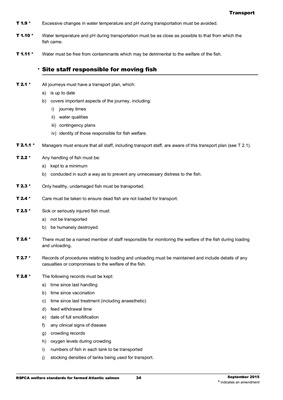
Transport
RSPCA welfare standards for farmed Atlantic salmon 34 September 2015
* indicates an amendment
T 1.9 * Excessive changes in water temperature and pH during transportation must be avoided.
T 1.10 * Water temperature and pH during transportation must be as close as possible to that from which the
fish came.
T 1.11 * Water must be free from contaminants which may be detrimental to the welfare of the fish.
* Site staff responsible for moving fish
T 2.1 * All journeys must have a transport plan, which:
a) is up to date
b) covers important aspects of the journey, including:
i) journey times
ii) water qualities
iii) contingency plans
iv) identity of those responsible for fish welfare.
T 2.1.1 * Managers must ensure that all staff, including transport staff, are aware of this transport plan (see T 2.1).
T 2.2 * Any handling of fish must be:
a) kept to a minimum
b) conducted in such a way as to prevent any unnecessary distress to the fish.
T 2.3 * Only healthy, undamaged fish must be transported.
T 2.4 * Care must be taken to ensure dead fish are not loaded for transport.
T 2.5 * Sick or seriously injured fish must:
a) not be transported
b) be humanely destroyed.
T 2.6 * There must be a named member of staff responsible for monitoring the welfare of the fish during loading
and unloading.
T 2.7 * Records of procedures relating to loading and unloading must be maintained and include details of any
casualties or compromises to the welfare of the fish.
T 2.8 * The following records must be kept:
a) time since last handling
b) time since vaccination
c) time since last treatment (including anaesthetic)
d) feed withdrawal time
e) date of full smoltification
f) any clinical signs of disease
g) crowding records
h) oxygen levels during crowding
i) numbers of fish in each tank to be transported
j) stocking densities of tanks being used for transport.